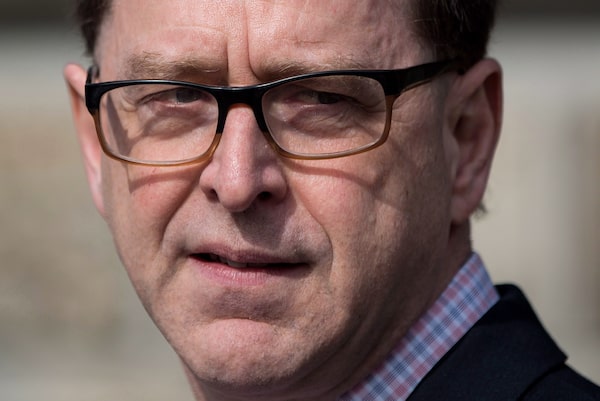
British Columbia Health Minister Adrian Dix, seen above, asked Harry Cayton last year to review the administrative and operational practices of the College of Dental Surgeons of British Columbia, and the province’s health professions act.DARRYL DYCK/The Canadian Press
The oversight body for British Columbia’s dental surgeons has sometimes put the interests of dentists ahead of those of the public, an expert on professional regulation has said, citing in his report the handling of a case that left a young woman with brain damage.
Health Minister Adrian Dix asked Harry Cayton last year to review the administrative and operational practices of the College of Dental Surgeons of British Columbia, and the province’s health professions act. His report recommended sweeping changes to how dentists and other health professionals are regulated. He raised concerns about record-keeping and internal communications.
Last year, The Globe and Mail reported internal details of how the college’s board handled allegations concerning sexually inappropriate comments from a college official.
“The Cayton report makes note that the [college] is only meeting 60 per cent of the standards of good regulation,” Mr. Dix said.
"It finds the college has an underlying culture of resistance to being fully focused on the safety of patients and provides evidence of significant ongoing dysfunction at the college, including ... advocacy of the profession over the public interest.”
The review also looked at how the college handled complaints from the public. In his report, Mr. Cayton detailed how the college handled a case related to sedation and anesthesia, citing a 2015 decision by a college disciplinary panel not to cancel the registration of a dentist who “had permanently brain damaged a young woman through his own deliberate acts.”
“The dentist provided deep sedation when he was not permitted to do so, failed to follow college guidelines, published false claims that he was authorized to provide sedation, failed to exercise the level of skill and care necessary and failed to monitor his patients," the report said.
But the college levied only a three-month suspension and a fine in the case, Mr. Cayton said.
"The handling of this case by the CDSBC raises questions about its commitment to upholding standards of the profession and surely failed to give the public confidence that the CDSBC had either their safety or their interests at heart,” he wrote.
Mr. Dix said the government has accepted the report’s recommendations for the dental college and directed it to come up with an implementation plan within 30 days.
The college said in a statement on Thursday that it accepts the report and its recommendations.
“Minister Dix has provided a clear directive and we commit to meeting his expectations to demonstrate that we are protecting the public and working on behalf of patients and the public,” said the statement signed by board president Peter Lobb and registrar and chief executive Chris Hacker.
Mr. Cayton was hired to conduct the review in March, 2018, as part of sweeping changes at the college, including the addition of five new government-appointed directors to its board.
Vancouver lawyer Peter Gall conducted a confidential review for the college of its investigation into then-registrar and chief executive officer, Jerome Marburg, after a dentist accused Mr. Marburg of sexually inappropriate comments.
Mr. Gall concluded the college’s board had tried to “sweep this serious matter under the rug.” Mr. Marburg resigned the next month, in April, 2018.
Mr. Cayton also looked into, and discounted, allegations that the former registrar had manipulated board appointments.
“Several former and present board members alleged to me that the previous registrar had ‘appointed his friends to the board’ or had ‘packed the board with his friends.’ This is not true,” Mr. Cayton said in his report, adding that only the government can decide who it will appoint to the board.
In addition to his 21 recommendations related to the dental college, Mr. Cayton also called for an overhaul of B.C.'s system for regulating health professionals.
With regard to the overall regulatory framework, Mr. Dix has set up a steering committee to look at the proposals in Mr. Cayton’s report, including that some colleges merge.
Mr. Dix said he expects all colleges to consider the recommendations.
“There are advantages, it seems to me, to economies of scale, and advantages that will stem from professions working together,” Mr. Dix told reporters at a press conference on Thursday.
“I think that’s a modern view of what regulation should be.”
B.C. has 26 regulated health professions, of which 25 - including doctors, dentists and nurses - are governed by colleges under the Health Professions Act. One profession, emergency medical assisting, is regulated by a government-appointed licensing board under a separate statute.
 Wendy Stueck
Wendy Stueck